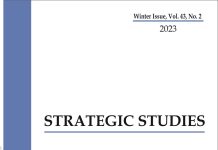Hassan Abbas, in Pakistan’s Nuclear Bomb, looks at how Pakistan acquired its nuclear weapons capability. However, the title is misleading since his major focus is on Abdul Qadeer Khan’s proliferation activities. He delves into the motivations and proliferation activities of the Khan network and his dealing with Iran, North Korea and Libya. Essentially, he tries to decipher whether it was a rogue operation orchestrated by one person or was it a more complicated one involving other entities and persons. He asks contentious questions like what caused the proliferation from Pakistan through Khan’s network.
Abbas uses the bureaucratic politics model, introduced by Graham Allison, to explain the acquisition of Pakistan’s nuclear weapons technology and insights into network’s proliferation activities. “The theory explains how Khan, along with some other players in the military and civilian bureaucracy, was able to manipulate the system and transfer nuclear technology to Iran, North Korea and Libya” (p. 12). He also takes a multitude of theories to make his arguments. He takes Peter Lavoy’s theory of myth-makers i.e., individuals in prominent positions who promote and execute certain ideas. He also takes Samuel Huntington thesis of Clash of Civilisations and applies it to justify his argument.













